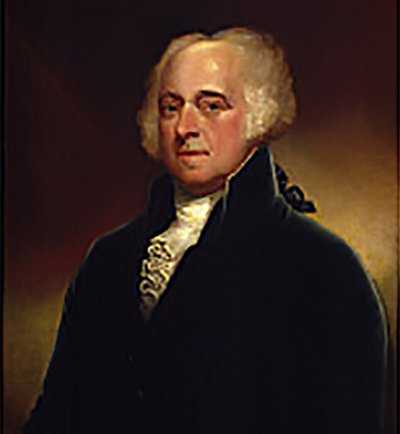Its John Adams!!!

In 1777, the Massachusetts governing body reported that the following assembly would draft another constitution which it would then submit to the voters for endorsement. (As of now, John Adams was filling in as a negotiator to France; Congress had designated him to set this pivotal organization together.)
In achieving its choice, the Massachusetts lawmaking body neglected to regard Adams' suggestion that constitutions should be drafted and approved by extraordinary traditions speaking to the assent of the general population. Amid the fall of 1775, Adams had prescribed that the general population must "erect the entire Building with their own hands upon the broadest establishment. This should be possible just by traditions of agents picked by the People. . . . "
The governing body's proposed constitution was submitted to, and dismissed by, the voters in 1778. Theophilus Parsons, a youthful legal counselor who might later ended up Chief Justice of the Massachusetts Supreme Judicial Court, drove the resistance. In a flyer entitled The Essex Result , Parsons, in words exhibiting the impact of John Adams, scrutinized the proposed constitution for not having been drafted by a body isolate from the assembly, to lack an announcement of rights (and for unequivocally overlooking bondage), and for neglecting to accommodate the partition of forces among the official, a bicameral lawmaking body, and the legal.
In 1779, the Massachusetts lawmaking body issued a call to the towns for each male tenant to choose delegates to shape a Convention for the sole reason for surrounding another Constitution, which would then require sanction by 66% of a similar electorate. Massachusetts accordingly imagined the idea of assembling a tradition of the general population, independent and separated from the governing body, for the sole motivation behind making a constitution.
John Adams Drafts the Massachusetts Constitution
In August 1779, multi week after he had come back from France to his home in Braintree, that town chose Adams as a delegate to the state established tradition, booked to meet on September 1.
The 312 agents chose John Adams, Samuel Adams, and James Bowdoin to serve on the drafting board of trustees, and "the other two lifted [John] Adams to draw up the state's constitution. He had progressed toward becoming, as he later stated, a sub-sub board of trustees of one." In drafting the Massachusetts Constitution, Adams drew upon his huge information of history and political logic, the settlements' encounters under British pioneer manage, and his own particular thoughts as enunciated in Thoughts on Government. Adams finished his draft by October 30, 1779. He cleared out Massachusetts in November 1779 to come back to Europe as clergyman emissary.
Following endorsement by town gatherings, the Constitution was confirmed on June 15, 1780, and ended up successful on October 25, 1780.
The Massachusetts Constitution
The Massachusetts Constitution contains three sections: a Preamble, Part the First: A Declaration of the Rights of the Inhabitants of the Commonwealth of Massachusetts, and Part the Second: The Frame of Government.
The Declaration of Rights
The Declaration of Rights, which was to some degree got from the Bill of Rights in a few other state constitutions, puts forward numerous individual rights which would later be incorporated into the government Bill of Rights. John Adams considered individual rights so essential to the development of government that the Massachusetts Declaration of Rights goes before the Frame of Government. (Balance this with the United States Constitution which puts forward a casing of government, to which the Bill of Rights was included two years after the fact, after delayed civil argument.) The Declaration of Rights incorporates preclusions against absurd inquiries and seizure, ex post facto laws, and people in general taking of private property without just pay. Ensured rights incorporate flexibility of the press, the privilege to appeal to the administration, appropriate to preliminary by jury, and opportunity of love.